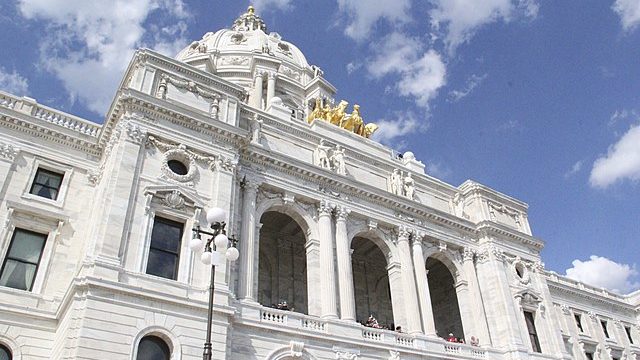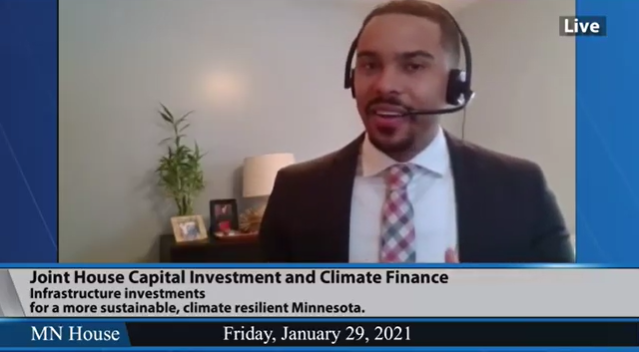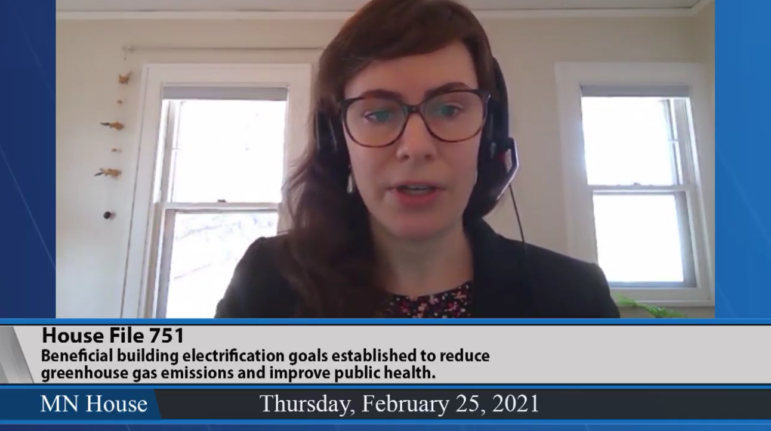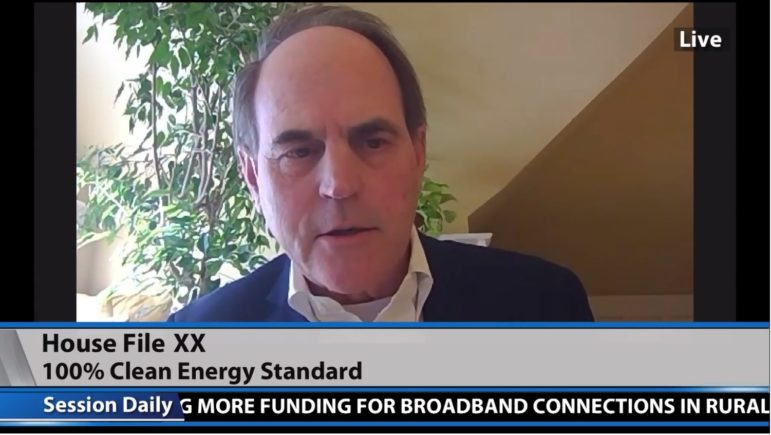
April 28, 2021 Update:
Conference committees have been appointed and will now begin the work of reconciling differences between the House and Senate versions of the energy omnibus bills in time for the Legislature to complete its works ahead of the May 17 deadline for adjournment. As of April 28, all of the provisions listed below remain alive and we hope that conferees will meaningfully consider all of these worthy items as they complete their work.
As we near the final month of the 2021 session of the Minnesota Legislature, Fresh Energy continues to diligently seek common ground within the Legislature and among Minnesota’s energy stakeholders as we pursue our mission to achieve equitable carbon neutrality by 2050. While this work is critical to Minnesota’s clean energy future, we strongly encourage the Legislature to take immediate action to address systemic, structural, and institutional racism in our systems of policing, justice, and public safety—an ongoing and pressing need as evidenced by the most recent police killing of Daunte Wright in Brooklyn Center. We are also actively working at the Legislature to ensure clean energy can play a role in community recovery.
For the second election in a row, Minnesota voters elected America’s only split-control legislature—the Minnesota Senate is controlled by a Republican majority while the Minnesota House is controlled by a DFL majority. In today’s hyper-partisan political climate, the work of finding consensus pathways forward has never been harder—or more important. Fresh Energy remains firmly committed to working collaboratively across political boundaries to find common ground wherever possible. We believe there are several meaningful and bipartisan steps that legislators could take yet this session.
Energy Conservation and Optimization (ECO) Act

The Energy Conservation and Optimization Act, also known as ECO Act, is a bipartisan bill that provides needed updates to Minnesota’s bedrock energy efficiency policy, the Conservation Improvement Program (CIP). For almost 40 years, CIP has been saving Minnesotans money by directing electric and gas utilities to achieve energy efficiency savings each year. The ECO Act provides needed flexibility for electric cooperatives to achieve energy savings; increases the energy savings goal for investor-owned electric utilities; and significantly increases the amount of money a utility must spend on energy efficiency improvements for under-resourced households, among other provisions.
The ECO Act is the final result of an involved stakeholder process that included electric co-ops, investor-owned utilities, the state’s largest natural gas utility, clean energy advocates, labor representatives, and others, represents an agreement forged among this broad group.
As far as the status of the bill goes, the House of Representatives passed the ECO Act off the floor with a bipartisan vote of 82-50 on April 12, and also included the language in their Energy omnibus bill. At the time of writing, the Senate passed the bill out of Chair Senjem’s Energy Committee with a bipartisan vote and it is awaiting a hearing on the Senate floor. This is where the ECO Act stalled in 2020, but with the renewed bipartisan interest in the bill, Fresh Energy is hopeful that this important policy will be allowed a discussion and vote by the Senate and become law this year.
Natural Gas Innovation Act
Another bipartisan initiative that has made progress in both the House and Senate this session is the Natural Gas Innovation Act (NGIA). While the NGIA is a complicated piece of legislation and currently exists in substantively different forms between the House and Senate, Fresh Energy recognizes the urgent need to rapidly begin decarbonizing our fossil gas utilities. NGIA provides a framework for doing exactly that—establishing a regulatory process for considering alternative technologies such as strategic electrification, efficiency, and “renewable” natural gas.
Importantly, the House version of NGIA includes several provisions that would collectively result in a broader, longer-term conversation about the future of Minnesota’s fossil gas system. Successfully transitioning to low and no-carbon solutions will require careful consideration of the costs, benefits, and best applications of various alternatives to fossil gas, and Fresh Energy is prioritizing bringing our economic and science-based approach to these discussions.
Strategies for Building Decarbonization

In January, the Minnesota Pollution Control Agency released the state’s latest greenhouse gas emissions inventory. The report found that buildings—residential and commercial—are the fastest-growing source of greenhouse gas (GHG) emissions in Minnesota. Left unchecked, emissions from the building sector have the potential to undermine virtually all of the progress Minnesota continues to make in cleaning up our electric grid. While the NGIA is one strategy for reducing GHG emissions from buildings, several additional items in the House bill would offer additional tools for addressing this critical problem area:
- An accelerated adoption cycle for the commercial energy code, which is the consensus result of a state-convened stakeholder process that had no opposition testimony in any committee this session, and
- A proposal from Governor Walz and the Department of Commerce to set a goal of cutting carbon emissions from existing buildings in half by 2035.
Rebuild Right
In May and June of 2020, while already disproportionately suffering severe health and economic impacts from the COVID-19 pandemic, communities in Minneapolis, Saint Paul, and elsewhere suffered an additional blow from the killing of George Floyd and ensuing civil unrest. Many small businesses, multifamily residential buildings, and public properties were damaged, and are now in the process of rebuilding and recovering. Providing these communities with the tools and resources to rebuild in ways that reduce utility bills, improve public health outcomes, and create jobs and long-term economic development is in the interest of all Minnesotans. We appreciate language in the House bill to establish a “Rebuild Right” grant program and are optimistic that this could be an area of bipartisan agreement in 2021.
100 Percent Carbon Free Electricity

The science is crystal clear—we have the technology and tools we need to avoid the worst impacts of climate change. But doing so requires that economies across the world drastically reduce emissions as quickly as possible and achieve net-zero greenhouse gas emissions by mid-century. The 100% clean electricity bill would move Minnesota forward on its path to decarbonization by requiring electric utilities in Minnesota to provide 100% carbon-free electricity by 2040. The need for this legislation continues to grow every day and we’ve seen states around the country step up and pass similar legislation. This is a top priority for Fresh Energy, as it will make a meaningful impact on our state’s greenhouse gas emissions.
The 100% carbon-free electricity bill was heard in the House Climate and Energy Committee, turning out broad support from the public. The provision is alive in the House’s Energy omnibus bill, but the same cannot be said of the other legislative body. Though introduced in the Senate, the Senate Energy Committee did not discuss the bill in committee, and it was not included in their Energy omnibus. The fate of this important provision will likely be decided through the conference committee process.
Clean Cars Minnesota
Transportation is the highest-emitting sector in both Minnesota and nationally. For the past year and a half, the Minnesota Pollution Control Agency (MPCA) has been leading a rulemaking process called Clean Cars Minnesota, which allows the state to adopt higher standards related to vehicle emissions than the baseline required by the federal government. The proposed MPCA Clean Cars Minnesota rule would increase the fuel efficiency of all cars sold in the state while also making electric vehicles more widely available for purchase.
The public has turned out in force to support the adoption of Clean Cars Minnesota with 744 people submitting comments through Fresh Energy’s online portal alone. However, this rulemaking is being threatened by proposed legislation in the Senate. SF450 (Mathews) would strip MPCA of its explicit and long-held authority to regulate vehicle emissions—thereby canceling the Clean Cars Minnesota rulemaking process. This bill was heard in several Senate committees in 2020 and has continued to receive hearings in the Senate this legislative session. At the time of writing, the bill has passed through the committee process as stand-alone language, and it has also been included in the Senate Environment Finance omnibus bill.
Fresh Energy, along with clean energy, climate, and environmental nonprofit allies, has been working hard to prevent this extremely problematic language from becoming law. We will continue to advocate against this bill at the Legislature but we need all Minnesotans to once again take action for Clean Cars Minnesota and oppose legislative intervention into the MPCA’s rulemaking process.
Since the start of the 2021 legislative session, Fresh Energy staff have been frequent faces and voices, providing oral and written testimony at dozens of committee hearings. While we’ve been advocating for many bills that are good for clean energy, we’ve spent hundreds of hours playing defense on bills that would send Minnesota backward and rob us of the progress we’ve made. With less than a month of session left, we’re doubling down on our efforts. Stay tuned for more information, and speak up in support of clean car standards!
Learn more.
Tune in to our April 15 episode of “Decarbonize: The Clean Energy Podcast” for a deeper conversation on this topic with Fresh Energy’s Executive Director Michael Noble, Lead Director of Public Affairs Justin Fay, and Senior Associate of Public Affairs Anna Johnson.
